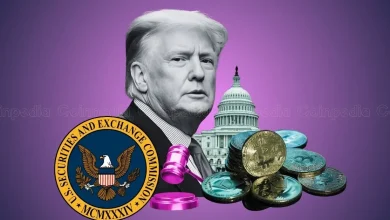
The financial landscape is witnessing a significant evolution as cryptocurrencies, once met with skepticism, are now being embraced by institutions worldwide. This paradigm shift in investment strategies and financial services mirrors a broader recognition of digital assets’ potential to reshape the global economy.
The Growing Prominence of Bitcoin ETFs
On January 10th, a pivotal change occurred in the institutional perception and legal classification of Bitcoin when the Securities and Exchange Commission (SEC) gave its nod to spot Bitcoin ETFs. This move sparked considerable interest from both institutional and retail investors earlier this year. Currently, 36 different ETFs are traded on U.S. markets, amassing over $61 billion in total assets. Only gold ETFs boast a larger asset size than Bitcoin ETFs.
On September 20, the prominence of Bitcoin ETFs was further bolstered as the SEC approved the listing and trading of options for BlackRock’s spot Bitcoin ETF on the Nasdaq. With nearly $23 billion in assets, BlackRock’s spot Bitcoin ETF has become one of the fastest-growing ETFs in history. Larry Fink, BlackRock’s CEO, who once criticized Bitcoin, now regards it as “digital gold” and a legitimate financial instrument.
Bitcoin’s Post-Election Surge
Market analysts anticipate Bitcoin’s price to surpass the $100,000 mark by the end of November, having already reached a record high of $90,000 on November 13, shortly after the U.S. presidential election. The total market value of cryptocurrency assets has surged to approximately $3.1 trillion, driven by expectations of pro-crypto policies under the new administration. With nearly 30-40 percent of Americans already holding crypto, Trump’s pro-Bitcoin stance has further incentivized institutional investments, anticipating regulatory changes that could benefit them.
The recent approval of U.S. Bitcoin ETF options trading by the Commodities and Futures Trading Commission (CFTC) has amplified market interest, marking a significant milestone for the cryptocurrency. This approval is expected to increase the exposure of Bitcoin as an investment instrument among Wall Street players, potentially boosting its price in the near future.
Why is Bitcoin Attractive to Wall Street?
In a remarkable shift, more Wall Street billionaires are turning to Bitcoin (BTC) as a hedge against inflation, moving away from traditional government bonds. According to Forbes, prominent investors, including BlackRock CEO Larry Fink, have expressed growing confidence in Bitcoin’s potential to safeguard their portfolios amidst concerns over U.S. monetary policies and escalating national debt.
Over the past decade, Bitcoin has surged by an astounding 22,208%, contrasting sharply with the U.S. dollar’s depreciation by 33%. This performance disparity underscores Bitcoin’s appeal as a long-term investment vehicle. With a capped supply of 21 million coins, Bitcoin ensures scarcity, making it inherently resistant to inflation. This characteristic is particularly attractive to investors seeking assets that can retain or appreciate in value over time, unlike fiat currencies that can be printed in unlimited quantities.
MicroStrategy’s Bitcoin Strategy
MicroStrategy, led by Michael Saylor, holds more Bitcoin than any other public company. The company has acquired 279,420 BTC, representing roughly 1.33% of the total Bitcoin supply. MicroStrategy employs a unique strategy of raising debt capital to purchase Bitcoin, theorizing that they can repay fiat debt by selling less Bitcoin in the future. This strategy is gaining traction among other companies.
The company’s next step, dubbed the “21/21 Plan”, involves raising $42 billion to double its current Bitcoin holdings. With 252,200 Bitcoins already on its balance sheet, worth over $21 billion at current prices, MicroStrategy has the largest Bitcoin holdings of any company globally, surpassing even the U.S. and Chinese governments.
Are Other Firms Following Suit?
Japanese firm Metaplanet is emulating MicroStrategy’s Bitcoin acquisition strategy, resulting in a substantial gain in its BTC yield and nearly doubling its valuation since the year’s start. After adding Bitcoin to its treasury in September 2020, the MSTR stock price surged by a staggering 2200%. The firm began acquiring Bitcoin as a treasury asset in May to counter the declining yen and challenges from low interest rates and high national debt. By late October, Metaplanet had increased its Bitcoin holdings to 1,018.17 BTC, with total investments nearing $64 million.
Semler Scientific is intensifying its Bitcoin acquisition, increasingly transforming from a medical device company into a Bitcoin Treasury Company. Robinhood Markets, a financial services company offering stock, ETF, and cryptocurrency trading, is also on a Bitcoin accumulation strategy, with control over 136,755 BTC according to Arkham Intelligence.
Marathon Digital Holdings, a Bitcoin mining giant, owns 27,562 BTC but sold 766 BTC in March 2023. The third-largest Bitcoin holding by a public company is Tesla, Inc., with 11,509 BTC.
The Strategic Bitcoin Reserve for the U.S.
President Trump has pledged to enhance the regulatory environment for cryptocurrencies and allocate more government resources to support Bitcoin. Inspired by MicroStrategy, the U.S. government could initiate its own Bitcoin buying spree next year. With a vision for a strategic Bitcoin reserve, the U.S. might acquire as many as 1 million Bitcoins, compelling other nations to follow suit to keep pace.
Can Corporate Giants Propel the Next Bull Run?
Wall Street billionaires’ shift to Bitcoin as an inflation hedge marks a significant change in investment strategies, highlighting growing confidence in the cryptocurrency’s potential. With its impressive growth metrics, finite supply, and decentralized nature, Bitcoin presents a compelling alternative to traditional assets like government bonds.
Wealth management clients of Wall Street banks such as Goldman Sachs, Bank of America, and Morgan Stanley continued to modestly accumulate or trade Bitcoin through spot Bitcoin ETFs in the third quarter. Goldman Sachs reported acquiring about $418 million in various Bitcoin ETFs through its quarterly 13-F filing with the Securities and Exchange Commission. This includes a substantial $238 million stake in the iShares Bitcoin Trust, representing nearly 7 million shares as of June 30. Additionally, Goldman took significant positions in the Fidelity Wise Origin Bitcoin ETF FBTC, Invesco Galaxy Bitcoin ETF BTCO, and smaller amounts in other newly launched Bitcoin ETFs.
Morgan Stanley was the first among major Wall Street players to permit its 15,000 financial advisors to pitch Bitcoin ETFs, specifically those issued by BlackRock and Fidelity, to clients with a net worth exceeding $1.5 million. JP Morgan reported minimal crypto exposure with around $42,000 worth of shares in Grayscale’s Bitcoin fund and another $18,000 worth in the ProShares Bitcoin Strategy ETF.
HSBC holds nearly $3.6 million worth of spot Bitcoin holdings from the fund issued by Ark 21Shares, while UBS has around $300,000 worth of spot Bitcoin ETF holdings. Bank of America has collective holdings of approximately $5.3 million, primarily from BlackRock and Fidelity.
“The crypto markets are strong because we have the sentiment shift,” Galaxy Digital chief Mike Novogratz told CNBC in May. “Crypto is now an asset class. It will be next year, it will be forever. And it wasn’t that way two years ago. There was risk around the asset class, and it’s been de-risked.”
Roadmap for Companies Embracing Bitcoin
As high-net-worth individuals and ultra-high-net-worth individuals increasingly show interest in cryptocurrencies, institutions have responded by incorporating digital assets into their portfolios and product offerings. This shift is crucial for driving further institutional adoption.
The rise of secure custodial services, including platforms like Coinbase Custody and Bitco, has provided robust solutions. Equipped with advanced security features, these services have played a vital role in making the crypto market more accessible to institutions.
Institutional involvement signifies that cryptocurrencies are no longer merely speculative assets but have become legitimate investment opportunities. The introduction of products designed for easier investment, such as ETFs and trusts, enables retail investors to gain exposure to digital assets through familiar and regulated channels.
Many analysts and enthusiasts anticipate another explosive bull run in 2025, potentially rivaling or surpassing the 2021 rally. With Bitcoin (BTC) leading the charge, the potential involvement of large institutions could ultimately drive Bitcoin prices to unprecedented levels.






